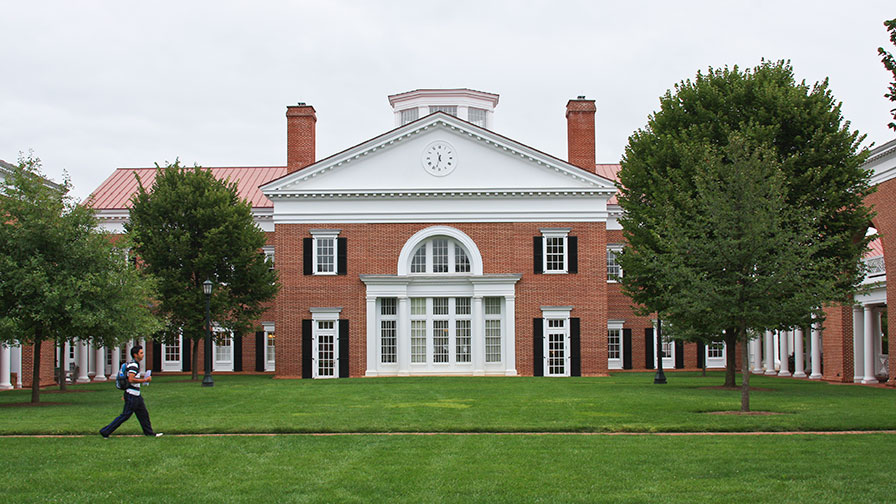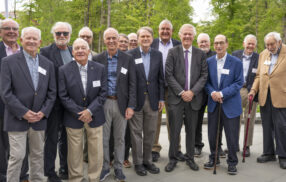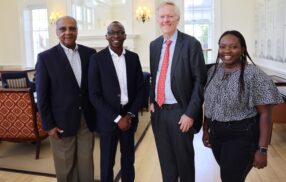
i.Lab Incubator Welcomes Kathryne Carr
For Kathryne Carr, the director of UVA’s i.Lab Incubator [link=http://ilabatuva.org/incubator.shtml], a workplace assignment nearly 30 years ago turned out to be a seminal moment. It was 1983, and Carr had just been hired as the assistant to the CEO of Genetic Systems, in Seattle. Those were heady times for the young field of biotech. “The money was flowing in,” Carr recalls, and her company was eager to catch this wave. Genetic Systems had been founded several years earlier to use monoclonal antibodies to develop diagnostic products—initially for respiratory and sexually transmitted diseases—as well as therapies. Its success depended on bridging the gap between a discovery in a scientist’s lab and a marketable product.
Carr’s assignment: write a white paper detailing how to make that happen. How do you transform an idea into a commercially viable product? What are the milestones to watch for? Where are the go/no-go decision points? “I wrote that paper and along the way educated myself and the company on this crucial process,” she explains. “And everything in my career since then has flowed from that, helping to translate research from the bench to the marketplace.”
Carr has always sought out positions where she believed she could make a difference. After graduating from college, at the height of the late 1970s energy crisis, she went to work for Mitre Corporation as a research analyst on alternative energy. When the crisis abated, and the spotlight shifted, biotech and life sciences presented itself as a promising area for Carr.
Her move to Charlottesville in the mid-1980s to raise a family coincided not only with the early years of the biotech boom but also with UVA’s initial exploration of technology transfer. Carr immediately became a part of those efforts. From 1986 to 1992 she was a project manager for Innotage Management, working with technology licensed from UVA and other institutions. And she has served on the boards of the university’s Patent Foundation (now the Licensing & Ventures Group) and the UVA-Coulter Foundation Translational Research Program, among others.
She has also put her knowledge and skills to work as a venture capitalist. As a cofounder of Whetstone Capital Partners and of Tall Oaks Capital Partners, both of which have focused on life science and medical device companies, and as an angel investor herself, Carr has been deeply engaged in the nurturing and development of numerous ventures. Over 26 years, she has been involved with 22 companies, 15 of which survive as stand-alone companies, divisions of larger organizations, or products within acquiring companies.
“A lot of your lessons you learn the hard way,” she noted, “and I learned that hiring leaders who are prepared to do whatever is necessary to drive the new company to a successful outcome is key. They need to be creative, resourceful, and tenacious. I love the teamwork and all that goes into driving a technology to proof of concept. When I put money into a company, I go along with it.”
As the director of the i.Lab Incubator, which for its 2013–2014 class accepted applications not just from Darden students but from aspiring entrepreneurs across U.Va. and the local community, Carr offers her tremendous energy and enthusiasm as well as the deep insights into entrepreneurship she’s gained over her decades of involvement. “Here I’ll be dealing with a much broader landscape of businesses than I have as a venture capitalist,” she notes, “everything from fishing reels to food trucks to high tech.” The basic principles, however, are the same. “There’s no absolute recipe,” Carr explains, “but there is a discipline. You need to find your proof points and drive toward them like crazy. It’s really important to find out quickly if the answer is no, if your idea or technology is not going to work, so that you can focus on what does work. If you’ve got a great team of people, they can find ways to develop a good opportunity.”
Speed is a hallmark of her approach. The goal, she says, is for ventures to be investor-ready by the end of the ten-week summer incubator program. “And then entrepreneurs need to be really careful with their capital,” she says. “It goes away quickly.”
Also central to Carr’s approach is a belief in the importance of working across disciplines, which UVA president Teresa Sullivan has emphasized as a crucial focus for all schools at the university. Carr’s appreciation of interdisciplinary thinking also goes back to Seattle: “When I was at Genetic Systems, we were meeting with some architects who were working on a building for us. And one of our researchers started talking about her attempts to understand what we were then calling the AIDS virus. She knew that it was an incredibly complex virus but didn’t know much else at the time. So the architect started talking about how he and his colleagues approached complex problems. ‘I’d build a scaffold,’ he told the researcher, ‘and then start attaching to it whatever you know or discover. That way you’ll start to understand the structure of the virus.’ That was a moment of great insight for the researcher.”
Interdisciplinary approaches can yield such moments of discovery, but they also have a more immediate and practical purpose. Carr hopes to facilitate connections across the university that will put people in touch with expertise that complements their own. Sometimes the inventor and the entrepreneur are the same person, she notes, but other times those capabilities reside in different individuals, who need each other.
Ultimately, Carr sees the i.Lab Incubator as another area where she hopes to be able to make a difference—and not just for the entrepreneurs who enjoy its services or for those who invest in their ventures. “We have a real problem in this country with jobs,” she notes. “I don’t think a lot of new jobs are going to come from existing industries. I hope that I can make a contribution here.”
The University of Virginia Darden School of Business prepares responsible global leaders through unparalleled transformational learning experiences. Darden’s graduate degree programs (MBA, MSBA and Ph.D.) and Executive Education & Lifelong Learning programs offered by the Darden School Foundation set the stage for a lifetime of career advancement and impact. Darden’s top-ranked faculty, renowned for teaching excellence, inspires and shapes modern business leadership worldwide through research, thought leadership and business publishing. Darden has Grounds in Charlottesville, Virginia, and the Washington, D.C., area and a global community that includes 18,000 alumni in 90 countries. Darden was established in 1955 at the University of Virginia, a top public university founded by Thomas Jefferson in 1819 in Charlottesville, Virginia.
Press Contact
Molly Mitchell
Associate Director of Content Marketing and Social Media
Darden School of Business
University of Virginia
MitchellM@darden.virginia.edu





